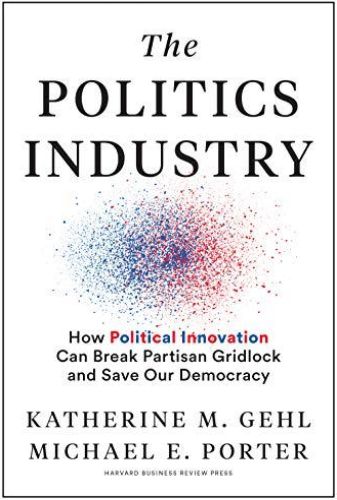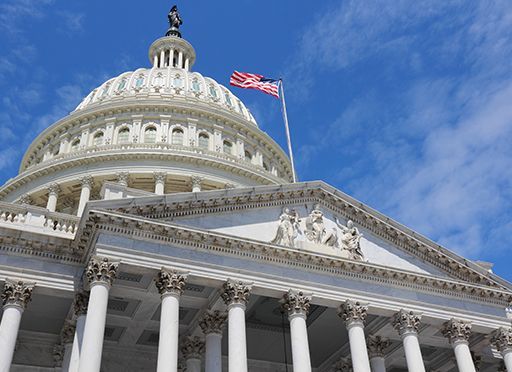A Harvard professor and a business leader detail the destructive flaws in the current US political system and offer real-world, practical solutions.

Smash the System
Business leader Katherine M. Gehl and professor Michael E. Porter recognize that Americans feel strong distaste for the extreme partisanship dividing the nation. Yet people have grown accustomed to this toxic status quo, and so they feel positive change is impossible. Gehl and Porter, in this disciplined, aware and thought-provoking book, highlight how the American political scene has evolved to this point and why change must come to protect national interests and the majority of citizens. The authors explain how the electorate can implement much-needed reforms.
Politicians from both sides of the aisle honored this work. Republican senator Mitt Romney said, “A noted business leader joins America’s preeminent business strategist to diagnose what ails our political system and prescribe a cure.” Former Democratic senator Even Bayh called it “an actual manual for how Americans can reclaim our democracy and make it work for the people rather than for the political-industrial complex. Read it and act!”
Powerless
Gehl and Porter maintain that major questions – such as why it’s normal to face limited choices at the ballot box and why independent candidates rarely win – don’t typically occur to most people.
We accept dysfunction, gridlock, government inaction – even in the face of national adversity – as normal.Katherine M. Gehl and Michael E. Porter
To fix US politics, the authors argue that you must first understand the invisible machinery that drives the system.
The Political-Industrial Complex
Elections and legislation aren’t for the public, Gehl and Porter assert. Politicians work to preserve the power of the political-industrial complex, which perpetuates and serves itself.
Gehl and Porter detail a system that includes political parties, donors, pollsters, think tanks, special interest groups, consultants, lobbyists and political media. They are adamant that the politics industry doesn’t care about constituents.
The Democrat–Republican Duopoly
Gehl and Porter report that, under the US election primary system, both parties use deep pockets and exploit low voter turnout to push candidates who hold the party line. Once in office, winners care only, the authors lament, about reelection.
In our current system of running for office and legislating, if you do your job the way we need you to, you’re likely to lose your job.Katherine M. Gehl and Michael E. Porter
Plurality voting, Gehl and Porter explain, enables a candidate in a three-way race to win without a majority of voters, which raises barriers to independent candidates.
An Iron Grip
From the mid-1940s to the 1970s, the authors relate, the House of Representatives achieved its legislative work in bipartisan committees. Procedures and norms provided a protective barrier against partisanship; for example, Gehl and Porter note, the House chose committee chairs based on seniority.
The authors recount how, in 1995, Speaker Newt Gingrich slashed nonpartisan research staff, eliminated chair tenure requirements and put neophyte party loyalists in charge of committees.
This is not democracy. It is partisan oligarchy.Katherine M. Gehl and Michael E. Porter
The House holds fewer committee hearings today than ever before, Gehl and Porter disclose, and those consist mostly of political grandstanding. A scant number of bills make it out of committees; the process, the authors warn, makes action and change exceedingly difficult.
Political Gridlock
Gehl and Porter believe that Congress’s inaction has spurred a national decline. The current system encourages politicians not to solve problems: The authors make one of their most important points when they state that if Congresspeople resolve a problem, the voters and the money behind that problem disappear.
And, Gehl and Porter divulge, longer term issues that affect the quality of the nation, like infrastructure spending, don’t receive attention. Electoral politics, they emphasize, shuts out moderates, so fringe elements that spur division take power.
This results, Gehl and Porter hold, in a public that distrusts government – a disillusionment that affects people’s willingness to support democracy and that fuels support for authoritarianism. The political system, the authors recognize, ignores middle- and working-class Americans.
To resolve this imbalance, the authors stress, Americans must focus on implementing practical, sustainable solutions; gaining gradual, broad-based consensus; addressing a balance of short- and long-term needs; and maintaining adherence to the Constitution.
Improving Elections
Gehl and Porter insist that the United States replace its primary system with single-ballot, nonpartisan primaries in which all voters would participate and the top five winners would go on to compete in the general election. They also say that America should do away with plurality voting in favor of ranked-choice voting – if any one candidate wins more than 50%, that decides the election.
Many reforms are needed, but ranked-choice voting can be the Archimedean lever of change, enabling a small force to move a great weight. (Political scientist Larry Diamond)
This would, the authors avow, give average voters more power, minimize barriers to entry, and increase competition, innovation and ideas. These changes would reduce the pressure on politicians to run divisive or smear-based campaigns.
Gehl and Porter caution that the party duopoly will virulently oppose any such changes. The authors urge reformers to jettison existing written rules, informal practices and precedents that reinforce partisanship.
Hard-Nosed Reform
Gehl and Porter are fervent patriots; they believe in American democracy and feel compassion for what they describe as widespread anger and despair at the current state of US partisan politics. Grounding their historical summary and proposed changes in hard-nosed, nonpartisan realism, the authors provide readers with the context, inspiration and tools to foment crucial reforms. As Gehl and Porter note, the current two-party system will fight these changes, and partisan citizens will decry or ignore these conclusions. But frustrated readers anywhere on the political spectrum will recognize the wisdom of the authors’ suggestions and embrace them. This is a timely, intelligent and forceful work.
Companion reading in the realm of bursting the logjam of US politics includes Breaking the Two-Party Doom Loop by Lee Drutman, Why We’re Polarized by Ezra Klein and What’s the Matter with Kansas? by Thomas Frank.






